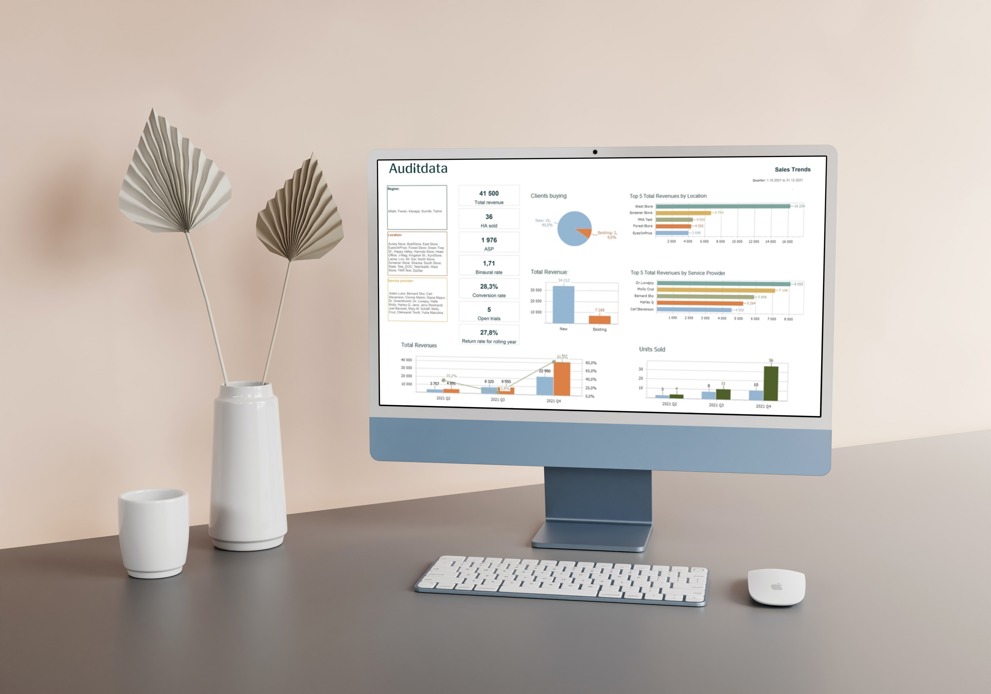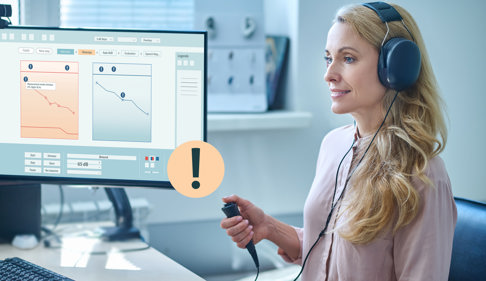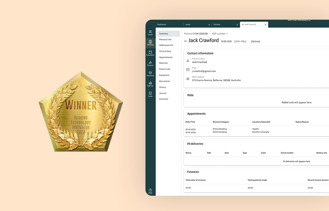
An audiologist’s primary responsibilities are identifying customers with hearing loss, conducting proper evaluations, making accurate diagnoses, and providing appropriate solutions. This is done through a carefully constructed workflow, a proper series of tests, and personalized decisions based on each customer’s unique needs and the severity of their hearing loss.
Some audiologists consistently follow best-practice protocols and provide high-quality service, but others may rush through appointments, potentially skipping crucial tests, making assumptions, or relying on default decision-making.
Audiologists – like other healthcare providers – sometimes make diagnostic errors. In fact, reports show that an astounding 10-15% of medical diagnoses are incorrect, according to an article in Hearing Health and Technology Matters. In hearing clinics – as in other healthcare settings – diagnostic errors may occur due to "clinical blind spots.”
For instance, an audiologist might make assumptions or swift decisions, either because they’re overconfident or because they’re rushing through appointments (or both!). Perhaps they're making incorrect decisions or diagnoses because they haven’t conducted a complete and thorough exam or followed the proper workflow to conduct all recommended tests. Or they aren’t following the proper steps to avoid errors.
So, for clinic owners, managers, and heads of audiology: Do you know what really goes on in your hearing clinic? Do you have data (or other proof) that your clinicians consistently perform high-quality examinations, follow best practice workflows, conduct fittings properly, and recommend the most appropriate hearing aids for each customer’s specific needs? And is your clinic looking at (and using) this critical data to drive better business decisions?
The Future of Audiology Is Data-Driven
Suppose you aren’t regularly reviewing, assessing, and analyzing detailed reports, such as business analytics, quality assessment overviews, workflow overviews, and audiometry and fitting overviews. In that case, you won’t have a comprehensive, accurate view of your centers or your clinicians. It’s not enough to rely on a “gut instinct” about the center’s performance or areas that need to be improved. Clinic owners and managers should use data-driven reports to improve performance and outcomes on both the clinical and commercial sides.

Our blog 'Excel in your hearing business with nudging' talked about the value of highlighted nudging, which can enhance hearing exams' quality, accuracy, and consistency. Now, we’ll explore another huge benefit of real-time assessment: centralized clinical auditing and detailed reports.
Reports help hearing clinic owners, managers, and audiologists:
- Access comprehensive patient data for knowledge management, quality assessment, and outcome analysis
- Spot trends
- Identify and rectify any issues or problems (including noncompliance)
- Make more informed, data-based decisions
- Develop and follow clinical best practices
- Demonstrate the quality and effectiveness of care
- Ensure that their clinicians are consistently adhering to the highest industry standards
Clinical Data Provides Insights Into Clinical Efficiency And Improves Patient Care
Auditdata’s dashboards provide comprehensive overviews in easy-to-understand reports. Using these valuable reports, center management can quickly, easily, and accurately audit audiological testing across their organization.
We’ve created reporting specifically for the audiology industry, which measures:
- Performance across the enterprise, or drilled down by clinic and/or audiologist
- Performance trends by clinic and/or audiologist
- Tests conducted
- Quality of the assessments
- And more…

Having access to performance metrics provides a comprehensive view of what’s happening across the clinics to ensure that best practices are consistently being followed. Center owners and managers can get insights about their clinicians’ performance and how well they’re following best practice workflows. Detailed, data-driven reports provide information about clinical practice patterns, such as:
- Which clinician performed each hearing exam
- Which tests were performed during each exam
- Whether clinical protocol and best practices were followed
- Whether a clinician deviated from the proper workflow (and whether deviations are occasional or recurring)
- How long the hearing exam took
- The hearing exam outcome, e.g., diagnosis, proposed solution, whether the customer was fitted with a hearing aid, etc.
A huge benefit to real-time quality assessment is the centralized, automated auditing of all audiology processes and clinical exams, allowing audiology centers to document and validate their clinical quality.
If the reports show deviations from best practice protocols, center owners, managers, and heads of audiology can immediately address and rectify any performance issues. Conversely, if they view positive reports, center leaders can have complete confidence in their clinicians’ performance, with data to demonstrate their higher efficiency and decreased errors.
These reports provide concrete proof of performance – rather than relying on a center owner’s “gut feelings” that things are (or aren’t) going well.
Data Drives Better Business Decisions

In addition to providing critical data about clinician performance and operational efficiency, Auditdata’s reports spotlight key metrics around business operations, including:
- Show up rates
- Cancel rates
- Sales numbers/units sold
- Return rates
- Conversion rates
- Capacity utilization
- ...and more
This allows clinic owners and managers to analyze data and make fact-based business decisions. For instance, if sales numbers rise (or drop) dramatically at a center, center leaders can look at reports to determine why.
Higher than average sales numbers might be due to an especially efficient, conscientious audiologist who follows the proper workflow, conducts the appropriate tests, makes a well-informed diagnosis based on test results, and provides the correct solutions to improve their customers’ hearing.
Low sales numbers could indicate a disconnect between the audiologist and your protocols. If an audiologist isn’t measuring, fitting, and/or counseling customers properly, it could lead to dissatisfaction, poor sales, low conversions, and other unsatisfactory results.
Read more about specific KPIs for different staff type in hearing care, from our blog: Setting effective objectives and KPIs for different staff types in hearing care
Contact Us For More Information
Auditdata helps hearing care providers improve clinical care and drive their business performance and growth. We offer data-driven, connected solutions to help you take your audiology business to the next level.

Other Blogs You Might Enjoy:

Setting Effective Objectives And KPIs For Different Staff Types In hearing Care
Setting and discussing key performance indicators (KPIs) for hearing care is a tricky business. KPIs require time, effort, and employee buy-in to live up to their high expectations.

Excel In Your Hearing Business With Nudging
Nudging helps by guiding hearing care providers through complex decisions, focusing more on the client and less on the workflow and process, helping hearing centers enhance clinical quality and ensure best practice testing processes are consistently followed.

10 Essential Tools Every Modern Hearing Care Practice Needs
As audiology hearing center owners work to differentiate their businesses through superior customer experience and service offerings, it’s critical to have the best tools.
Don't Miss Out On the Latest Insights On Audiology
Sign up today to receive exciting updates, tips, and the latest newsletters from Auditdata.
Resources
⭐️ Hearing Health and Technology Matters
⭐️ Avoiding Clinical Blind Spots with Good Audiology
⭐️ 5 Steps to Avoid Medical Errors in Audiology
⭐️ Blog: 'Excel in your hearing business with nudging'
⭐️ Analysis of clinical performance - FREE course
⭐️ Setting effective objectives and KPIs for different staff types in hearing care





